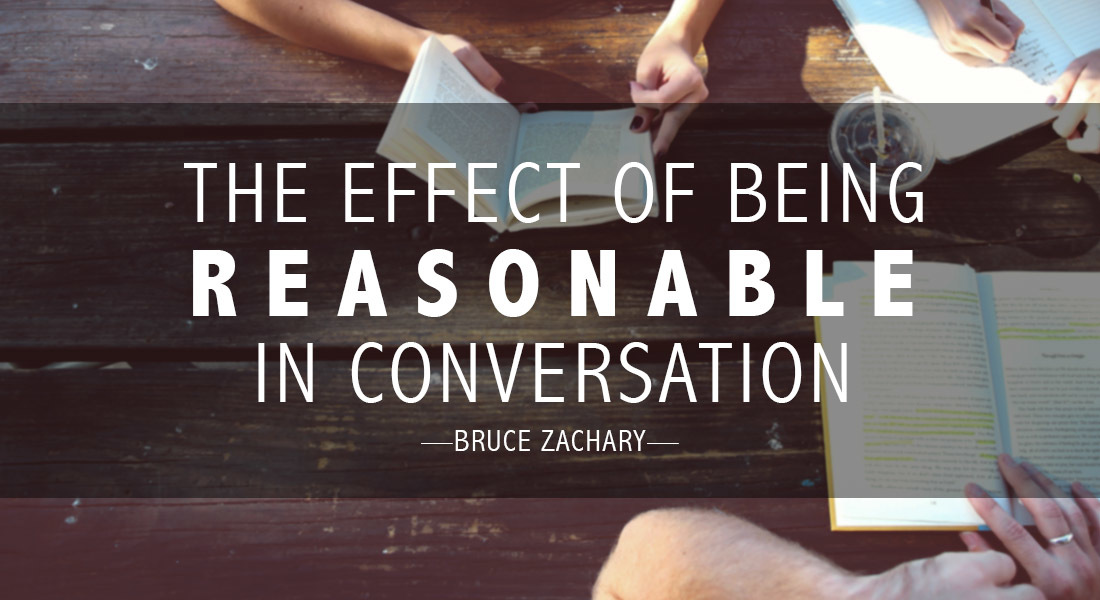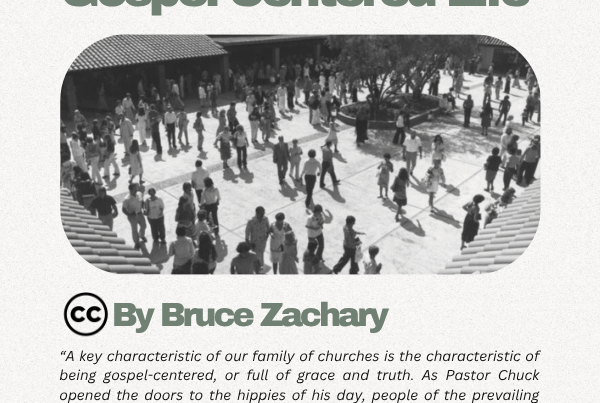
On Labor Day, my wife Karen and I hosted a BBQ in our condo complex, and some of our neighbors joined the fun. One couple has been married 59 years. They met in Memphis and were high school sweethearts. His sister used to hang out with Elvis, as his career began to skyrocket. The wife talked about what it was like watching Elvis become famous. I asked, “What was Memphis like growing up?” And she talked about small schools, white clapboard churches, warm nights on patio swings and the like. Then I gently asked, “What was it like to live in the South in those days?” She paused and replied, “We were so unreasonable! Black people in the back of a bus, separate schools, drinking fountains, dining … We were so unreasonable!”
To be a reasonable person means to be fair, sensible, just and having sound judgment.
Are you reasonable?
The Christian faith, unlike any other worldview, philosophy or religion is reasoned and reasonable. Thus, a Biblical worldview can withstand critical analysis. Therefore, God invites us to think, “Come now, let us reason together says the Lord” (Isaiah 1:18). And we are called to love God with all of our mind (Deuteronomy 6:4-5; Matthew 22:37-39). Thus, followers of Christ should be reasonable since Jesus is reasonable.
The term “reasoned” is related but distinct. We see this term regularly applied to Paul’s ministry. For example, Paul reasoned with Jews in the synagogue at Thessalonica (Acts 17:2). The Greek term translated “reasoned” is dialegomai. It is not too difficult to see the connection to our English word “dialogue.” Dialogue seems like a benign friendly conversation. Nevertheless, dialegomai, as it related to Paul, wasn’t simple dialogue. The term in Paul’s context related to the practice of listening to another’s worldview and then refuting that view point-by-point to persuade them of the correctness of your view. This style of reasoning can be very effective in contrasting the gospel and Christian worldview with other beliefs. On the other hand, this style of dialogue may not be reasonable when discussing countless issues that are important to God.
People are passionate about many issues. And they may discover that others have a polar opposite perspective. Unfortunately, there are too many people who claim to be followers of Christ who are unreasonable as they enter into these conversations. It misrepresents Christ when we are rude, proud, dismissive, condescending, unloving, unfair and unjust. We should be able to dialogue and share perspectives with gentleness, respect, humility and compassion. Jesus displays compassions without compromise and so should those who claim to be His followers.
We need spaces to share and exchange our views regarding: racism, sexual harassment, gender discrimination, sexual sin – hetero and homo, gender identification, LGBT discrimination, the triumphs and tragedies of government, the idea that Jesus didn’t come to save America (nationalism) but Americans, and Nigerians, and Koreans – both North and South. We need safe places to talk about politics whether you’re liberal, conservative, apolitical, communist, socialist or undecided. We need to have places to discuss what can we do to help the homeless, the widows, the orphans, the fosters and the refugees. We need safe places to talk about how the local church tends to treat as lepers those who have had an abortion or have been divorced. We need to be encouraged that it is okay to talk about gluttony, over-indulging in alcohol or drugs. We need to experience the hope that problems that appear polarizing and likely to stir passions can be discussed in a reasonable way by people seeking to be reasonable.
I dream of God’s people gathering together and sharing their values, perspectives, and seeking to learn from one another, and listen to one another. I imagine people discovering how to be more reasonable as they learn God’s Word and heart on each of those issues and more. The Church, God’s people not the building, should be the most likely to create that space. But it requires reasonable people. And alas, they seem to be on the endangered species list. We need people willing to listen with a desire to hear and understand and empathize, not simply to listen to plan a rebuttal. We must learn how to respond in the Spirit and not react in the flesh.
What I often see on social media is ranting and so unreasonable.
Yes, a rant on social media will stir your constituents to like your content, but it is generally unlikely to exchange ideas, change values or change culture in a God-honoring way. Typically, it is not loving nor reasonable. Generally, social media is not the ideal platform for a healthy reasonable exchange. Similarly, a Sunday morning worship gathering is less than ideal. It is a passive learning environment, characterized by a primary speaker(s) and many passive listeners who are actively rehearsing their rebuttal silently in their heads as they tune in or out, while the speaker seeks to share his or her take on these complicated matters. The speaker may earnestly try to be reasonable, as in fair, sensible, just and having sound judgment. Even if the speaker studied the Scriptures, and the issue was researched and approached from varied perspectives, it is unlikely to be truly reasonable. The speaker cannot remove their own bias and prejudice, and competing views are not heard or considered. I’m not suggesting that we do away with sound Biblical teaching, because it is necessary. I am stating that I believe that it is inadequate for a reasonable dialogue and exchange of ideas and values.
If you are a reasonable person, who is interested in discussing these and other similar issues, with other reasonable people who may have very different views from you, I have an idea I’d like to share …
I’d love to see small groups meet in neighborhoods in coffee houses, homes, apartments, condos, parks, Mars Hill, etc. I’d love for people to share with one another what they believe, and what they think that God says about the issue and why. These gatherings would not be the debate club, nor the exchange of two opposing commentators seeking to mock their opponent, but reasonable people engaged in dialogue as disciples of Christ. People who recognize that to truly love God supremely and to love their neighbor as themselves requires engaging the most polarizing issues in a reasonable way. And, I’d love to invite group leaders to stand on the platform on Sunday morning and share about the messy, glorious experience and invite more people on a reasonable journey.









